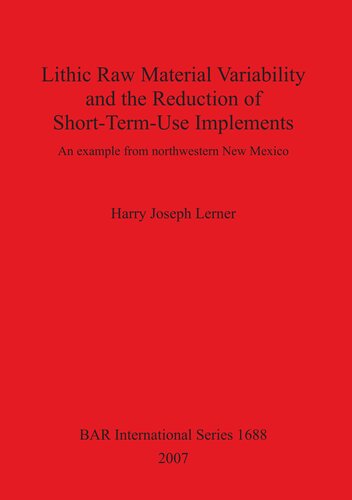

Most ebook files are in PDF format, so you can easily read them using various software such as Foxit Reader or directly on the Google Chrome browser.
Some ebook files are released by publishers in other formats such as .awz, .mobi, .epub, .fb2, etc. You may need to install specific software to read these formats on mobile/PC, such as Calibre.
Please read the tutorial at this link: https://ebookbell.com/faq
We offer FREE conversion to the popular formats you request; however, this may take some time. Therefore, right after payment, please email us, and we will try to provide the service as quickly as possible.
For some exceptional file formats or broken links (if any), please refrain from opening any disputes. Instead, email us first, and we will try to assist within a maximum of 6 hours.
EbookBell Team

4.1
80 reviewsChipped stone tools are a truly dynamic medium of material culture. From initial reduction to contemporary excavation, lithic artifacts undergo continuous change. The role of the properties of raw materials in determining rates of use-wear accrualis poorly understood and has rarely been assessed quantitatively. This study offers such quantification regarding four materials exploited for the production of short-term use implements at the Late Archaic FA2-13 site located just outside the cityof Farmington, New Mexico. Both experimental and archaeological use-wear evidence was assessed in separate but related ways. Digital image analysis of use-wear invasiveness using ClemexVision PE and GIS analysis of use-wear homogeneity using IdrisiKilimanjaro yielded distinct but highly complementary results. Direct testing of material properties of non-archaeological samples using a Hysitron Triboindenter served to further clarify these findings in terms of the complex relationship between raw material surfacehardness and roughness. The results of the present study show that there are significant differences between rates of wear accrual among the four materials. Analysis of tools from FA2-13 indicates that while scraping activities likely did predominate, it may also be feasible to generate more detailed assessments regarding the kinds of scraping activities that were undertaken and the respective intensities with which they were performed. This increased insight can then be extrapolated for application to long-term use technologies and their more complex life histories.